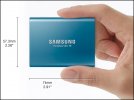SD cards aren't the best possible answer, but for the purpose we're using them for here they as good of an answer as we have right now. As technology develops that will change, just as we went from videotape to better methods of holding our video data. The same kind of thing will happen with dashcams eventually.
I'm sure we all like the concept of using a large drive which can handle multiple cams, and it has proven workable with the commercial 'truck cams' we have right now. As I see things, what we're seeing with this today is the manifestation of the perspective being used in approaching the matter at hand. Those making simple dashcams know and understand how crucial high-res video quality is, and they get it for us. Those making the truck cams know and understand how crucial large reliable storage capacity is, and they deliver that. If we could meld the two approaches together we'd have the cams we want

But instead we're forced to choose between bad vids but lots of them or good vids and a questionable storage method

You'll see this phenomena at work with Anker and Garmin, who are tops with technology but who have had trouble making dashcams which do as we want them to do. Part of that is their lack of experience in the dashcam field and part of that is in their approach to the matter.- they think their knowledge of technology in general is sufficient for them to automatically make good cams

And part is that neither approach has bothered to embrace the other one; each simply goes their own way because they're most comfortable with that approach.
Some day we will get and have what we want: multiple high-res cams and high reliable storage capacity together in a relatively affordable unit. Whoever does that first will cause the dashcam market to change with their success being wanted by their competitors. Until that happens all we can do is wait and hope...
Phil
 Better would be nice, just not absolutely necessary.
Better would be nice, just not absolutely necessary.
